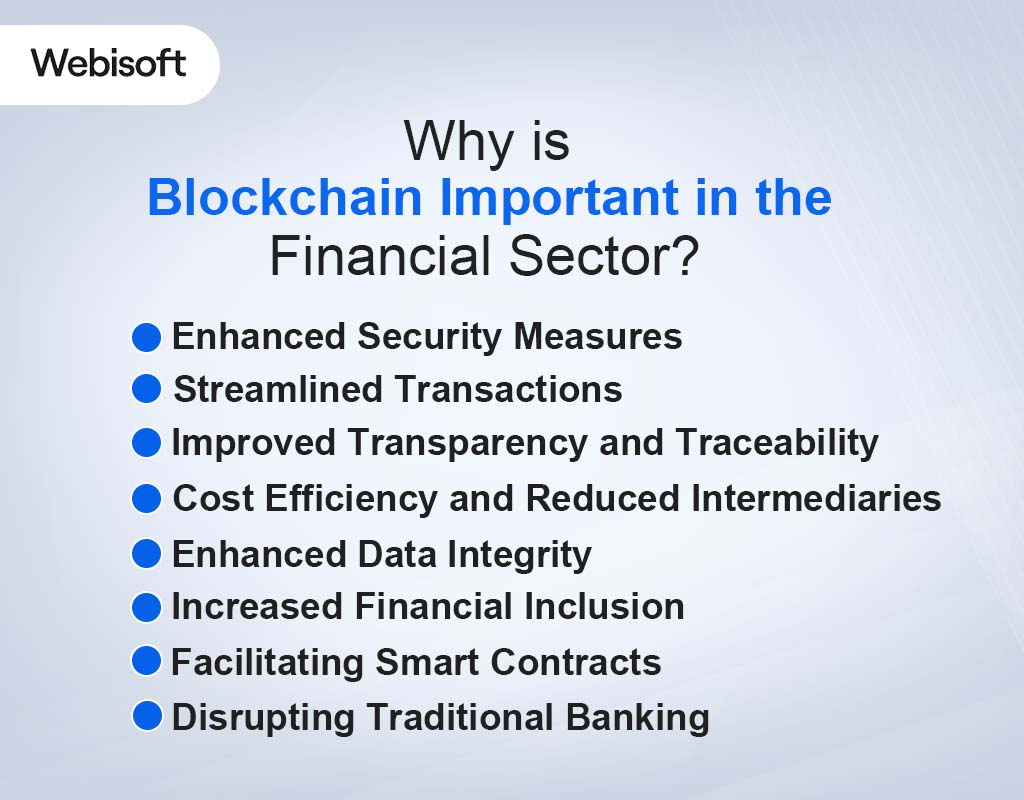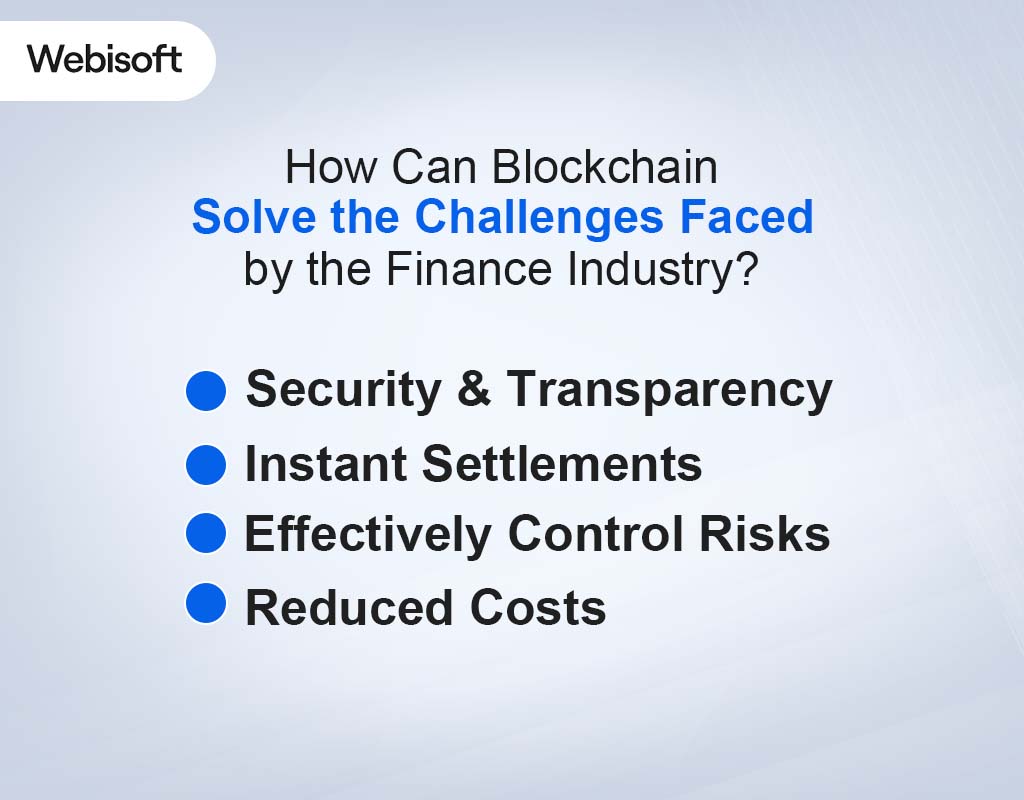Blockchain for financial services is a groundbreaking technology reshaping the industry by offering a decentralized, transparent, and secure ledger for recording financial transactions.
This innovative system revolutionizes the way financial data is stored and exchanged. It ensures immutability and reduces the need for intermediaries in transactions.
The financial services sector gets significant benefits from blockchain. Its benefits include enhanced security, reduced transaction costs, increased transaction speed, and improved transparency.
However, choosing blockchain means opting for a future-proof solution that revolutionizes traditional financial processes. It mitigates fraud risks and enables faster, more efficient transactions.
However, if you are searching for the best blockchain development services for the financial sector, look no further. Contact Webisoft. Discover how we can transform your operations with custom-made blockchain solutions.
Contents
- 1 What is Blockchain for Financial Services?
- 2 Why is Blockchain Important in the Financial Sector?
- 3 The Benefit of Blockchain in Financial Services
- 4 How Can Blockchain Solve the Challenges Faced by the Finance Industry?
- 5 Blockchain Use Cases in Financial Services
- 6 The Challenges in Using Blockchain for Financial Services
- 7 What are Webisoft’s Services in Blockchain for Finance?
- 8 Bottom Line
- 9 FAQ
What is Blockchain for Financial Services?

Blockchain in financial services refers to a decentralized digital ledger system that securely records transactions across multiple computers. It operates as a chain of blocks, each block containing a set of transactions linked through cryptography.
This technology enables transparent, immutable, and tamper-resistant record-keeping without the need for intermediaries like banks.
However, the best blockchain for financial services transforms financial sectors by offering a transparent, secure, and efficient platform for conducting various transactions and activities. It provides a decentralized and distributed system where transactions are validated, recorded, and stored securely.
Why is Blockchain Important in the Financial Sector?

Blockchain’s significance in the financial sector stems from its ability to bolster security, expedite transactions, enhance transparency, cut costs, and transform traditional financial systems. Integrating blockchain technology signifies a shift toward more efficient, secure, and inclusive financial services.
Enhanced Security Measures
Blockchain development increases financial security through cryptographic methods, ensuring tamper-resistant records and transactions. This secures sensitive financial data from potential cyber threats or unauthorized access.
Streamlined Transactions
Implementing blockchain expedites financial transactions, reducing time and costs linked with intermediaries. It facilitates direct peer-to-peer transfers, boosting transaction speed and efficiency.
Improved Transparency and Traceability
Blockchain’s transparent ledger provides complete visibility into financial transactions, fostering stakeholder trust. This allows whole audit trails and effective monitoring for regulatory compliance.
Cost Efficiency and Reduced Intermediaries
By eliminating intermediaries, blockchain significantly decreases operational costs within traditional financial processes. This cost-effectiveness enhances accessibility to financial services.
Enhanced Data Integrity
Blockchain’s decentralized structure ensures data consistency and integrity across the network. This prevents unauthorized alterations or data manipulation, ensuring reliability and accuracy.
Increased Financial Inclusion
Blockchain-driven financial services expand access to underserved populations, promoting financial inclusion globally. This technology enables those without traditional banking access to participate in financial activities securely.
Facilitating Smart Contracts
Blockchain enables smart contract creation and execution. It automated agreements that self-execute upon meeting predefined conditions. This feature modernizes various financial processes, reducing manual intervention.
Disrupting Traditional Banking
Blockchain challenges conventional banking systems by offering decentralized financial solutions. It encourages innovation and fosters competition within the financial sector.
The Benefit of Blockchain in Financial Services

Blockchain technology offers a multitude of advantages in the realm of financial services. Its decentralized nature and cryptographic security protocols have revolutionized traditional financial systems, offering numerous benefits.
However, the benefits of blockchain in finance are:
Security
Blockchain’s robust encryption and decentralized structure ensure secure transactions and data integrity. Your financial information remains protected and less susceptible to cyber threats.
Trust
Blockchain’s transparent and immutable nature fosters trust among users. Transactions are recorded on a shared ledger, enhancing reliability and reducing fraudulent activities.
Transparency
With a shared, unchangeable ledger, blockchain brings transparency to financial transactions. Every participant has visibility, promoting trust and accountability across the network.
Privacy
Blockchain allows for private transactions while maintaining transparency. Through encryption techniques, it offers privacy without compromising on security and transparency.
Programmability
Smart contracts on blockchain automate processes, executing predefined actions upon meeting specified conditions. This feature reorganizes financial agreements and reduces manual intervention.
Scalability
Blockchain’s scalability allows for increased transaction volumes without compromising efficiency. It accommodates the growing demands of the financial ecosystem.
High-Performance
Blockchain ensures high-speed transactions, enabling swift cross-border transfers and reducing processing times significantly.
How Can Blockchain Solve the Challenges Faced by the Finance Industry?

Blockchain’s application in the finance sector offers solutions to major challenges. It enhances security, transparency, and auditing, enables instantaneous settlements, reduces risks, and significantly cuts operational costs.
However, using blockchain technology, the finance industry can modernize operations, mitigate risks, and optimize efficiency for better financial services.
Security & Transparency
Blockchain’s decentralized structure enhances security, encrypting data to thwart unauthorized access. Transactions are transparent, eliminating discrepancies and fraud attempts.
Instant Settlements
Blockchain facilitates instant settlements, bypassing intermediaries and reducing transaction times from days to seconds.
Effectively Control Risks
Blockchain minimizes risks through smart contracts and immutable records by executing predefined actions and maintaining tamper-proof transaction records.
Reduced Costs
Implementing blockchain rationalizes processes, cutting intermediary costs and expediting transactions, leading to overall cost reduction.
Blockchain Use Cases in Financial Services

Blockchain’s applications in financial services are vast and transformative. They revolutionize capital markets, optimize payments , and enhance asset management. Moreover, they modernize trade finance, banking, insurance, collateral management. Even they propose a potential replacement for paper currency.
The technology’s transparency, security, and efficiency significantly impact various financial sectors. Those are:
Capital Markets
Blockchain transforms capital markets by digitizing assets, facilitating faster and more transparent transactions, reducing intermediaries, and ensuring compliance through smart contracts.
Payments and Remittances
In the payments sector, blockchain enables continuous cross-border transactions, cutting down processing time, lowering fees, and ensuring secure and traceable transactions.
Asset Management
For asset management, blockchain maintains a tamper-proof record of ownership, simplifies fractional ownership, and increases liquidity by tokenizing assets.
Trade Finance
Blockchain revolutionizes trade finance by digitizing and automating documentation, reducing paperwork, mitigating fraud through immutable records, and providing real-time updates.
Banking and Lending
In banking, blockchain enhances security, speeds up transactions, lowers operational costs, and fosters financial inclusion through efficient lending mechanisms.
Insurance
Blockchain optimizes insurance by automating claims processing, preventing fraud through immutable records, and enhancing trust between insurers and policyholders.
Collateral Management
It simplifies collateral management by providing transparent ownership records, automating verification processes, and reducing the risk of disputes.
Crypto Staking
Blockchain allows users to participate in securing networks and earning rewards by staking their cryptocurrencies.
Invoice Factoring
It modernizes invoice factoring processes by ensuring transparency, automating verification, and accelerating fund disbursement.
Paper Currency Replacement
Blockchain proposes a digital alternative to traditional paper currency, offering increased security, efficiency, and global accessibility.
The Challenges in Using Blockchain for Financial Services

Implementing blockchain in financial services faces hurdles related to integration complexity, regulatory compliance, scalability, interoperability, security, cost, etc. Overcoming these challenges requires innovative solutions, collaborations, and a deep understanding of the financial sector’s intricacies.
Integration Complexity
Integrating blockchain technology into existing financial systems is a multifaceted process. It requires thorough planning and often involves significant reconfiguration of legacy systems. Achieving unified integration demands a comprehensive understanding of both the current infrastructure and the nuances of blockchain protocols.
Regulatory Compliance Hurdles
Navigating the regulatory landscape poses a formidable challenge in adopting blockchain technology. The financial sector operates within a framework of strict regulations designed to safeguard customers’ interests and maintain the stability of the financial markets.
Scalability Limitations
The scalability challenge arises as blockchain networks expand. As transaction volumes increase, the capacity of blockchain systems to process these transactions efficiently becomes a critical concern. Overcoming this challenge involves developing scalable solutions and enhancing consensus mechanisms.
Interoperability Challenges
Interoperability remains a significant obstacle in the widespread adoption of blockchain within the financial sector. Ensuring that disparate blockchain networks can communicate and share data easily is crucial for the technology’s success.
Security and Confidentiality
While blockchain inherently provides transparency, ensuring data security and confidentiality without compromising transparency remains a delicate balance. Protecting sensitive financial data while maintaining the immutability and transparency of blockchain records is a complex challenge.
High Implementation Costs
Implementing blockchain technology involves substantial upfront costs, including investment in infrastructure, talent acquisition, and ongoing development. Financial institutions are required to allocate significant resources to research, development, and implementation, often causing hesitation due to the associated financial commitments.
What are Webisoft’s Services in Blockchain for Finance?

At Webisoft, we aim to revolutionize financial services through cutting-edge blockchain solutions. Our solutions are custom-made to raise your operations and drive innovation in the finance industry.
Blockchain Integration Solutions
Webisoft specializes in the integration of blockchain technology into financial systems, offering robust enterprise node solutions to ensure scalability and operational efficiency. We assess your existing infrastructure and deploy custom-made solutions to integrate blockchain while ensuring minimal disruption to your operations.
Customized Smart Contracts
Our team designs and implements smart contracts that automate financial processes, ensuring transaction transparency and trust. We craft these contracts to meet your business needs, enhancing efficiency and security.
Cryptocurrency Development
At Webisoft, we assist in creating and customizing cryptocurrencies, offering expertise in developing and launching tokens and coins on blockchain networks. We guide you through the entire process, from concept to implementation.
Security and Compliance Measures
We prioritize security and compliance in our blockchain solutions. Our services encompass robust security protocols and adherence to regulatory standards, ensuring the safety and compliance of your financial operations.
Consultation and Strategy
Our expert consultants offer comprehensive guidance and strategic advice, including Solana advisory, on leveraging blockchain in financial services. We analyze your business requirements and devise personalized strategies for effective blockchain adoption.
Bottom Line
Blockchain’s impact on financial services is monumental, offering a paradigm shift in managing data and conducting transactions. Its ability to enhance security, transparency, and efficiency makes it a game-changer in the finance industry.
However, blockchain for financial services signifies a commitment to staying at the forefront of innovation. And it gains the rewards of a more rationalized and secure financial ecosystem.
Unlock the potential of blockchain in financial services with Webisoft. Reach out today to explore our customized solutions for your business.
FAQ
Is Blockchain Secure for Financial Transactions?
Yes, it is! Blockchain’s encryption and decentralized nature make it highly secure and tamper-resistant, ensuring the integrity of financial data. Webisoft prioritizes this security in its solutions.
Can Blockchain Reduce Fraud in Financial Services?
Absolutely! Blockchain’s transparency and immutability minimize fraudulent activities by providing a secure, traceable transaction history. Webisoft implements this to mitigate fraud risks.
Does Blockchain Speed Up Financial Transactions?
Indeed! Blockchain’s decentralized structure rationalizes processes, enabling faster and more efficient transactions in financial services. Webisoft leverages this for optimized operations.
How Does Webisoft Implement Blockchain in Financial Services?
Webisoft modifies blockchain solutions, easily integrating them into financial systems to enhance security, transparency, and efficiency.
